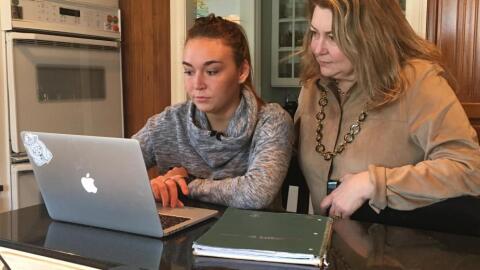The Ohio Supreme Court on Tuesday considers what could be the final appeal by the Electronic Classroom of Tomorrow.
ECOT closed last month because of financial trouble related to having to repay tens of millions of dollars in funding it never should have received. The affects on tax payers have gotten most of the attention, but former ECOT teachers and students say they're the real victims.
For the last few years, teachers and staff at ECOT tried to only speak out for the students. That’s according to former assistant principal Laura McNamara, who said those who worked at ECOT didn’t want to make it about themselves.
“That was the main focus was how can we help these students what can we do to help them,” McNamara said.
But the school’s abrupt closing has left the former ECOT employees in a tough situation.
First there’s the way staff was alerted to being laid off.
McNamara provided emails from ECOT human resources telling staff on January 31 at 10:30 pm that their health insurance would expire the next day on February 1.
“So these teachers who have been working all this time to support ECOT, to support students, decisions were made way outside of ECOT to terminate insurance for these teachers an hour and a half before the next day,” she said.
McNamara’s claim that these were decisions made outside of ECOT refers to a special master appointed by a Franklin County judge after the school closed.
That master was appointed last month to take over ECOT’s operations.
To make matters worse, McNamara says teachers were officially laid off after serving 119 days into the school year. In order for a year to count towards a teacher’s retirement they have to work 120 days.
“I don’t know it just seems like the target was to hurt ECOT teachers as much as they could,” McNamara said.
Now, there’s a reason ECOT closed. The Ohio Department of Education claims ECOT overbilled the state by tens of millions of dollars because the school couldn’t verify how many students were participating full time.
The way the state came to that conclusion and its request of student log-in information are the subject of the pending Ohio Supreme Court case. While the state was collecting millions in claw backs, ECOT ran out of money and their sponsor voted to cut ties last month.
McNamara has been a vocal critic of Gov. John Kasich and the way he’s handled ECOT’s closure. She says the governor should step in and keep the school open.
Kasich has been a strong supporter of school choice, and he spoke at ECOT’s graduation in his first year in office in 2011. But Kasich hasn’t said much about ECOT – though he has said several times that he does not intervene in decisions regarding schools.
“I don’t get in the middle of this kind of thing,” Kasich said when asked if he planned to do anything in regards to ECOT's closure.
Instead he leaves that up to his education department.
“Just have a good plan in place. So I’ve now followed all that up with a letter telling them you’ve got to get on the stick you gotta make sure these kids can be placed and they should be able to be placed if they can have effective work through the school board,” he added.
However, as McNamara points out, the Kasich administration played a pivotal role in a piece of legislation that allowed the state to takeover districts in academic distress, such as Youngstown.
Kasich’s office and ECOT did not respond to a request for comment.
McNamara says she understands that ECOT is in the middle of controversy but says the students, teachers and staff have become casualties of the fallout. Still looking for schools to enroll in and for new jobs.




